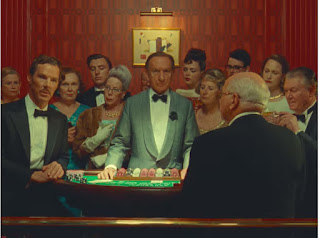#sriGINthoughts #reviews #Netflix #RoaldDahl
Roald Dahl is a fascinating writer, always with a penchant for
throwing unexpected twists at you. If you think Jeffrey Archer can twist a
story like a spring, I have to say that he doesn't hold a candle to Mr. Dahl!
His stories are dark, even the so-called children's/young adult books.
I vividly recall reading "Charlie and the Chocolate
Factory" to my children when they were young and wondered how it could be
called a kids' story with all the jealous, petty, snobbish characters strutting
around with a madcap like Willy Wonka. (Oh, Johnny Depp was wonderful in the
movie!)
But boy! Could Dahl spin a yarn?!
Among his many stories, two stand out in my mind: "Lamb to the Slaughter" and "Man from the South." The former for the sheer ingenuity of the situation—not the protagonist, mind you—and the latter for the depiction of how humans react to desperation (the story was smartly captured in the Tamil movie "Ninaithale Inikkum")
The Wonderful Story of Henry Sugar – Can you see without your
eyes?
This is a positive (a rarity from Dahl) story of a rich man finding his spiritual bearings and using his special powers for the benefit of the needy, like Robin Hood.
But the do-good part is just a footnote. What's important is, as Rahul Dravid, MSD, and others have professed, the process of getting there.
Benedict Cumberbatch and Ben Kingsley are wonderful, and the concept of dramatized-stage-read (with action in the background and foreground) was a bit unnerving initially but grew on one eventually.
If you put your
heart, mind, eyes, and whatever you want into something, you can achieve it.
More importantly, that effort will awaken your inner self. It's like the
#KarmaYogi in action!
The Rat Catcher – Must one become a rat to catch a rat?
A simple story, you might think. Not quite! Ralph Fiennes shines as the rat catcher. I also learned that plaster of Paris is enough to kill rats. They eat it, and moisture makes the plaster expand and congeal, depriving them of air. Rats die in no time! Oooo... I liked the allegation (?) that rat blood is used to make liquorice in the chocolate factory, and the explanation of how they make it reminded me of Willy Wonka.
The ending with the hook of "What
did the rats find nutritious to avoid eating the poison?" was delicious
indeed. Pun intended. 😊
The Swan – Can you truly break free and fly?
Dahl presents one of his more bittersweet tales, delving into the theme of bullying. The narrative explores how people cope with it, seek to escape it, and believe that distance, intelligence, or silence will provide refuge. Yet, nothing truly alleviates the pain, which lingers and festers even as one matures. Once again, the stark filming technique, employing prop-like sets while narrating the story and acting simultaneously, accentuates the disquieting atmosphere characteristic of Roald Dahl's storytelling.
######




